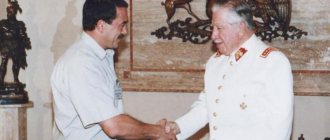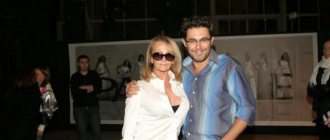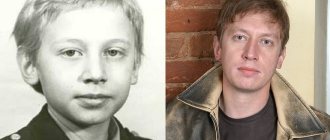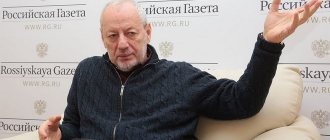Education
Mikhail Zygar is a graduate of the most famous and high-status educational institution in Russia - the Moscow State Institute of International Relations (MGIMO), graduating from the Faculty of International Journalism.
This educational process did not end there: Zygar later studied at Cairo University, which is one of the oldest educational institutions in the whole world. The year-long internship provided an opportunity to bring the level of theoretical knowledge to the required level, which Mikhail set for himself. After this, quantity turned to quality, and a vibrant and varied career began that continues to this day.
Bibliography
- Zygar M.V., Naumkin V.V., Zhukov A., Khadzhimukhamedov M., Khidoyatova N., Saifulin R., Urlaeva E., Sobyanin A., Shirin A.
Central Asia: the Andijan scenario?. - M.: Europe, 2005. - 192 p. - (Coups). — ISBN 5-9739-0016-9. - Zygar M.V.
War and myth. - St. Petersburg: Kommersant, Peter, 2007. - 416 p. — ISBN 978-5-91180-781-8. - Zygar M.V., Panyushkin V.
Gazprom. New Russian weapons. - M.: Zakharov, 2008. - 256 p. — ISBN 978-5-8159-0789-8. - Zygar M.V.
The entire Kremlin army: A brief history of modern Russia. - M.: Intellectual literature, 2020. - 408 p. — 6000 copies. — ISBN 978-5-9907223-0-9. - Zygar M.V.
The Empire Must Die: The History of Russian Revolutions in Persons. 1900-1917. - M.: Alpina publisher, 2020, 2020. - 909 p. — ISBN 978-5-9614-6712-3. — ISBN 978-5-9614-6495-5.
Publications:
- Publications by Mikhail Zygar - Slon.ru
- Publications by Mikhail Zygar - Forbes.ru
- Publication by Mikhail Zygar - Gzt.ru
- Publications by Mikhail Zygar - Openspace.ru
- Publications by Mikhail Zygar - Kommersant
- He is not a myth... - Kommersant, 2009.
Journalist career
Mikhail Zygar, being an employee of the Kommersant publication, was the author of reports from hot spots. He has reported from the scene:
- wars in Iraq;
- fighting in Serbia and Kosovo;
- wars in Lebanon;
- revolutions in Kyrgyzstan;
- wars in Palestine;
- execution in Andijan;
- transfer of “The Bronze Soldier” to Estonia;
- revolution in Ukraine.
Such activities require considerable courage and enterprise, so in 2014 the journalist was awarded a serious award: he became the laureate of the International Press Freedom Award, which was held in America (New York).
Later, the journalist himself summed up his activities with the words: “I realized that I was getting hooked on the war and was beginning to languish between business trips. I’m rushing to where it’s uneasy and where they’re shooting.” A spectacular point in the career of a war reporter was the written book “War and Myth,” in which the journalist spoke about all the events in which he personally participated.
The journalist wrote columns on well-known information, news and analytical Internet portals: Slon.ru, OpenSpace.ru, Gzt.ru and Forbes.ru.
“I want to describe everything from the inside. What people said and did exactly then, without rationalizing events after the fact.”
The main sources used in the book are letters and diaries. Autobiography is a genre that Zygar approaches with some skepticism.
“All autobiographies are written to defend their decisions. Nobody wants to admit that they were a fool.”
Mikhail Zygar is one of the most prominent Russian journalists. He became most famous in the world for his bestseller “All the Kremlin's Army.” His latest book, The Empire Must Die, is about the year 1917, when the revolution took place. First of all, it tells the story of those people who, in roaring, intoxicated Petrograd, tried to change the course of history and direct Russia onto the path of democracy.
© RIA Novosti, Alexey Filippov | Go to photobank Journalist Mikhail Zygar at the XXXI Nika National Cinema Award ceremony at Vegas City Hall.
And they almost succeeded. At least according to Zygar.
“Of course, Russia could become a democracy. By itself! In the spring and summer of 1917 there was a real will for this, a powerful public conviction that it was necessary to build democracy. Many politicians were ready to put aside all their old grievances. The only one who didn’t give a damn about all this was a journalist named Ulyanov.”
Vladimir Ulyanov, or Lenin - the name by which he later became known, plays an inconspicuous role in the book. Zygar believes that the Russian narrative of history revolves too much around Lenin as an individual. In his book, he presents a motley gallery of other characters: Leo Tolstoy, Sergei Witte, Zinaida Gippius, Pavel Milyukov, Irakli Tsereteli.
Lenin did not participate in any way in the first revolution. When he finally arrived in Petrograd from his political exile, he was viewed by most as an unkempt wiseguy who tormented those around him with endless lectures on how he would carry out a real revolution. According to Zygar, he was the only Bolshevik who refused to cooperate with the provisional government.
“Nobody took Lenin’s plans seriously. But he knew how to skillfully gather around himself the anarchist elements of society, to put it simply, semi-criminal layers,” says Zygar.
When the Bolsheviks succeeded in carrying out a coup d'etat in October 1917, they were a marginal group - and at the same time the most unprincipled and single-minded political movement in Petrograd. They used free speech and political openness not to shape democracy, but to overthrow it. The result was Stalin's reign of terror in a one-party state that lasted 70 years.
“It’s a disaster,” states Zygar.
“Was it a mistake to give the Bolsheviks so much space? Should European democracies give today's political and religious extremists less freedom? - I’m interested.
“There are thousands of small details where mistakes were made. The provisional government did not consist of experienced officials,” says Zygar.
Berlingske 04/28/2018 Apostrophe 04/28/2018 Bloomberg 04/28/2018 Wnp.pl 04/28/2018 UNIAN 03/01/2016 He prefers to be very careful when it comes to drawing parallels with the current situation. At the same time, there are really a lot of similarities, and this cannot but be striking when you read the book. First of all, the conviction of the Russian elite that foreign intrigues and conspiracies are everywhere seems so familiar to me that I burst into loud laughter several times while reading.
Zygar smiles in agreement.
“One thing has not changed - the person. It is still the same, and officials still have the same stereotypes in their heads. Before the revolution, the Russian elite was divided into two camps: one believed that an English conspiracy was being hatched against Russia, the other saw German spies everywhere.”
Zygar throws up his hands.
“One hundred years later, we can say that they were all wrong. There was no conspiracy, neither English nor German. It was all nonsense."
The title of the book, “The Empire Must Die,” is not a quote from the words of the book’s characters, it belongs to Zygar himself.
“This is what everyone in the book understands - we can’t continue like this. And still they can't do anything. Of all the available alternatives, they constantly choose the worst one, they waste time, they cannot make a decision.”
Anna-Lena Lauren: You describe the last Tsar Nicholas II as an indecisive, weak figure, with an expressionless face and a penchant for picking his nose.
Mikhail Zygar: Yes, he was famous for this. But this book is not about the king. History does not depend on one person, but on many different people. From March to November 1917, Russia carried out outstanding liberal reforms: it introduced universal suffrage, including for women, abolished the death penalty, and declared freedom of speech. This is incredibly interesting and proves that there was another way.
— Does Russia have another way now?
- Certainly. He is always there. But modern Russia is still dominated by the sentiments of 2014, when Putin made Russia great again (“made Russia great again”). That's why he was elected president. Election fraud is irrelevant as far as Russia's lack of politicians is concerned. During the presidential elections, we had two people who tried to be them, Ksenia Sobchak and Pavel Grudinin. If they continue, maybe something will happen, but it's a long process, and right now the trend is the opposite.
Still, Zygar is not one of those who believes that Russia is hopeless.
“Russia has always had the opportunity to become a democracy. Despite everything, we are a country that was able to go from the Great Terror in 1937 to freedom in 1991.”
Mikhail Zygar
37 years. Born in Moscow. Received diplomatic education at MGIMO. War correspondent for Kommersant from 2000 to 2009. Head of the political department of the Russian branch of Newsweek from 2009 to 2010. Editor-in-Chief of the only Russian independent TV channel “Dozhd” from 2010 to 2020. Today he is an independent writer and publicist.
Books: “War and Myth” (military report), 2007; “Gazprom - the new Russian weapon”, 2008; “The whole Kremlin army” (about modern Russian political history of Russia), 2020.
The Empire Must Die is released in Swedish at the end of April.
InoSMI materials contain assessments exclusively of foreign media and do not reflect the position of the InoSMI editorial staff.
Editor's activities
Mikhail Zygar appeared on the Dozhd TV channel in 2010 before important events in Russian history: the winter rallies of 2011-2012. His colleague on the TV channel was the well-known Ksenia Sobchak, who subsequently repeatedly said that Zygar was her main teacher in the field of journalism.
Against the backdrop of his activities on the Dozhd TV channel, the journalist made documentaries about Soviet and Russian modern history. Since 2010, amid his career as an author, program producer and TV presenter, he has also been the editor-in-chief of the Dozhd channel. At that time, the channel was very popular and was known for covering political events from the point of view of the opposition.
In 2020, Zygar announced his desire to leave the position of editor-in-chief to implement his own creative projects. But even today he can be seen on the TV channel as the host of the TV program “Zygar”.
Books and projects[ | ]
Book “All the Kremlin Army”[ | ]
In 2020, he published the book “All the Kremlin’s Army: A Brief History of Modern Russia”[18].
Nobel Prize winner in literature Svetlana Alexievich called the book “the most serious study of everything that has happened in 20 years”[7]. Writer Boris Akunin called it “an informative, surprisingly cold-blooded and completely impartial recent history of the Russian state.” According to political technologist and publicist Stanislav Belkovsky, “All the Kremlin’s Men” is better than all his books about Vladimir Putin combined. According to literary critic Galina Yuzefovich, the book “forms a new language for talking about modern politics” and is “a smooth and bright text that lives by the laws of real great literature”[19].
The book has been translated into German, Polish, Bulgarian, Finnish[20], Estonian, Chinese and English. In 2020, the book became a two-time winner of the Runet Book Prize in the categories “Bestseller” and “Best Digital Book”[21]. By 2020, more than 100 thousand copies of the book had already been sold[22].
A reviewer for the influential British weekly The Economist points out that the book contains no sources confirming information supposedly coming from knowledgeable circles. The reviewer believes that the opinions attributed by the author to Putin should be assessed with caution[23]. The book received widespread coverage in the international press. A reviewer for The Guardian noted that this text is one of the “most exciting” stories about Putin’s Russia[24].
The book "The Empire Must Die"[ | ]
After leaving the Dozhd TV channel, Zygar studied the history of the 1917 revolutions. The result of his work was the book “The Empire Must Die”, which was published during the centenary of the revolution simultaneously in Russian (by Alpina Publisher)[25] and in English[26]. This is a story about how Russian society lived a hundred years ago - the destinies of Tolstoy, Diaghilev, Rasputin, Stolypin and other important characters of the early 20th century are intertwined in it [ source not specified 930 days
].
"Project 1917"[ | ]
On November 14, 2020, Zygar launched the project “1917. Free History”, in which, in real time, Internet users can follow the diaries, thoughts and experiences of more than one and a half thousand heroes of events a hundred years ago. All entries are based on documentary materials - diaries, memoirs, letters, photographs, etc., which can be shortened to simplify perception, but the meaning always remains the same[27]. The project is an example of a new genre of “network series or documentary reality show with elements of historical literature, dramatic theater, serials and modern social networks”[28]. It should end on January 18, 2018, the centenary of the dissolution of the Constituent Assembly[29].
Financial assistance to the project was provided[30] by the founder of the Dynasty Foundation Dmitry Zimin, the General Director of Yandex Arkady Volozh (Yandex is the publisher of the project) and the Chairman of the Board of Sberbank German Gref, the social network VKontakte became a partner of the project. In 2020, exhibitions should be held in Moscow and St. Petersburg; director Kirill Serebrennikov planned to stage a play based on the project[31].
In February 2020, the English version of the project was launched[32].
"1968.DIGITAL"[ | ]
On April 23, 2020, the studio of Mikhail Zygar and Karen Shainyan “History of the Future” launched a documentary series[33] for mobile phones 1968.DIGITAL. The series tells about the heroes and events of 1968 through the screen of a smartphone, which the hero could have had if there had been the Internet, social networks and mobile applications at that time.
The series was first presented in English on the Apple News platform[34] together with its US partner Buzzfeed News. Alfa Bank became the general partner of the Russian project, distribution partners were Amediateka and Vkontakte. The series is also published in France on the platform of the newspaper Libération.
By December 2020, the series had been watched more than 30 million times. It also became the most popular Russian series in Amediatek[35] and received several awards for the best video project and series: Tagline Awards, The Digital Reporter Award in the web industry. And the author of the project, Mikhail Zygar, received the “Enlightener-2018” award in the digital category[36].
MHT. Mobile art theater[ | ]
At the end of June 2020, together with theater critic Alexei Kiselev, he launched the Mobile Art Theater - a project that is an audio performance with navigation. The user downloads the application to his mobile phone, pays for access to the content (in 2020 - 379 rubles [37] per performance), starts the audio tracks, and then moves along the route indicated by the audio guide.
The first performance is “1,000 Steps with Kirill Serebrennikov,” a promenade along the route that the director walked every day during the last months of house arrest. The second performance is “The Pig Farmer and the Shepherd”, the third is “The Master and Margarita”.
“We set ourselves the task of making a democratic theater that is understandable to the modern Internet audience. In Moscow, St. Petersburg, London and New York at the same time,” says Zygar.
Writing activity
The journalist made a serious contribution to the coverage of events in Russian history by publishing the book “All the Kremlin’s Army: A Brief History of Modern Russia.” The work received recognition from critics, who unanimously came to the conclusion that this is the most complete and best study of all the important events of the past century and the beginning of the current one.
Publicist Belkovsky said that the best author who most accurately described the activities of Vladimir Putin is Mikhail Zygar. The books have been translated into 5 languages, so the work has become known almost all over the world. The work was repeatedly awarded the title of “bestseller”.
In light of this, the book “The Entire Kremlin Army” is considered a must-read for every person interested in their native history.
In addition, Zygar was the author and co-author of the following books:
- "War and Myth";
- “Central Asia: Andijan scenario?”;
- "Gazprom: New Russian weapon."
Not a single work of Zygar’s writing was left without the attention of critics and readers: an elegant and light style of narration, interesting and non-trivial reasoning, relevant topics.
Mikhail Zygar: “I thought from the very beginning that this would be a hell of a gamble”
Mikhail Zygar // Photo: Personal archive
Before it even appeared, Mikhail Zygar’s documentary novel “The Entire Kremlin Army. A Brief History of Modern Russia" became a bestseller. Of course - a former war correspondent for Kommersant, a publicist with a range of acquaintances from the top officials of the state to the main tycoons of national business, a journalist who was especially singled out by Dmitry Medvedev himself, already in the introduction writes this: “When starting work on the book, I thought that this there will be a story about what happened to Russia over the past 15 years, how the attitude and worldview of Vladimir Putin and his inner circle changed, how it all began and where it all led us.” The 34-year-old author himself was led to the fact that two months after the book was published, he resigned as editor-in-chief of the Dozhd TV channel and was not invited to the last meeting of journalists with the chairman of the government. Today he is busy with the multimedia project “Free History of Russia”, and is also working on his own television program, “which he never got around to.” But I started our conversation with a fact that amazed me. At the last Nobel Prize ceremony, among the few guests of laureate Svetlana Alexievich, Mikhail Zygar sat in the front row. And what’s absolutely incredible is that they only met in person in Stockholm!
Yes its true. Until this day, we had not seen her,” confirms Mikhail. - I noticed, Andrey, that writers’ communication is different from that of ordinary people. They consider those whose books they have read to be their acquaintances. Boris Akunin, for example, is a very private person and does not allow anyone into his inner circle. But after watching “The Entire Kremlin Army...”, he began to talk to me very warmly and in a friendly manner. It was the same with Svetlana Alexievich. She read and understood everything about me. But something else is surprising. When Svetlana gave the Nobel laureate’s speech, and she did it in Russian, talking about the brightest moments of her books, I saw with my own eyes how, following the interlinear translation, many in this gilded hall cried.
— Have you already had meetings with readers? What's the most surprising question you've been asked?
The big revelation for me was what my readership looks like. These are people from 17 to 25 years old, university students or graduates. With a bunch of books for friends and comments, they say, we finally understand everything, because it’s impossible to watch the news, but here everything immediately falls into place. Moreover, before they were not at all interested in politics.
His new book is read not only in Russia. Many foreign publishing houses are also waiting for it // Photo: Personal archive
— The bestseller of the 90s, Larisa Vasilyeva’s novel “The Kremlin Wives,” are you familiar with it?
No, but they often ask why I don’t have anything about my personal life, details about Vladimir Putin’s family?
“That’s exactly what I wanted to ask.” After all, much that is happening today, everything that we see in Navalny’s latest investigations, comes from the family - whether it is the Russian or Turkish elite, it does not matter.
As for Putin, it would probably be possible. But what has happened in the country over the past 15 years, and no one here has any doubts, his family had almost no influence. This is a sideline that wouldn't have made the story any richer, but maybe I closed my eyes. As for the families of other people... The bright, strong image of Tatyana Borisovna Yumasheva, in whom there is a reflection of the powerful personality of Boris Nikolayevich Yeltsin, their family relationships influence a lot.
When I ask whether there will be a continuation, Mikhail says: “We still have to live. For now, I’m adding another chapter about Syria for translated publications. It was a fortunate coincidence that I know the president of this country, Bashar al-Assad, personally and interviewed him.” // Photo: Personal archive
— As a TV professional, can you explain why the most watchable program recently was the broadcast with the participation of Vanga’s daughter?
All I can do, Andrey, is to quote the ancient hit: “What can I say, what can I say, that’s how people are built.” I constantly hear: you talked for a long time with the president’s inner circle, what will they do next? I have made predictions wrong many times, so I try not to make them. If you make predictions, at best they will be forgotten, and at worst you will turn out to be an idiot and they will remind you that you blurted out. Vanga’s daughter can afford it because this is her first appearance on our TV.
— There are persistent rumors that Dmitry Medvedev was offended because you called him False Dmitry in the novel.
This is not true, and I have a book about this. People love conspiracy theories and secret schemes. They are used to the fact that everything is for a reason. It’s as if such a small Vanga peeks out from every corner and whispers: “Everything is really a set-up, this is another cunning plan.”
Ksenia Sobchak is Misha’s close friend and one of the first readers // Photo: Personal archive
— At the same time, envious people claim that even your departure from the Dozhd TV channel was done to increase circulation.
I would not like, especially out of nowhere, to acquire the image of a victim, because if you are oppressed, this is a kind of reputation. And if they don’t oppress you and everything is fine with you, but everyone shouts: “Oh, he’s poor,” it becomes unpleasant. It's only nice when something is deserved.
— Did any of the powers that be, about whom you wrote in the book, call you?
I can’t hand over everyone, but yes, they called. From the very beginning I thought that this would be a hell of a gamble and that they would be seriously offended by me. But that did not happen. I was told the reaction of one person, and I will say right away - this is not Medvedev. The man is there tangentially, and that’s what he was most offended by, that little has been written about him. I was also surprised how many heroes called or wrote with an assessment that everything was accurate.
- How did you know all this?
I only found out half of it.
The former editor-in-chief continues to communicate with leading Dozhd employees and make programs // Photo: Personal archive
— After reading the book, my mother said that she was very afraid for you.
And my mother, on the contrary, said: “Now, thank God, I’m not afraid for you. Because it turned out simple, clear and interesting.”
— If you have time, what do you read?
Yes, everything in a row and mostly memories. The most interesting were the memories of Andrei Sakharov. This is amazing, action-packed prose. Just finished reading Pamuk, in the trial of Gore Vidal. Alexievich also re-read Volkogonov’s trilogy “Lenin. Stalin. Trotsky." I can study several books at the same time, and in general my life has changed dramatically since I learned to read on my mobile phone. Because, even if you are without a bag, your phone is always with you, and when, and this is a disease, you constantly check your email or WhatsApp, you simultaneously go into your book. You switch, relax, and at the same time learn something interesting. Perhaps a somewhat strange reading mode - every hour for ten minutes, but I like it.
— Your documentary novel does not begin from the beginning, so I’ll formulate the question this way: “Will there be a beginning?”
How it goes, because we have to live to see it. Now I am writing another chapter about Syria for translated publications. It so happened that I know the main character, the president of this country, Bashar al-Assad, personally. Seven years ago I interviewed him, and I have something to tell.
Mikhail always listens to the opinion of Natalia Sindeeva // Photo: Personal archive
—What did you want to become as a child?
Conductor.
— Have you been seriously involved in music?
I didn't study at all. But when my parents brought me to the circus, all the children stared at the arena, and I looked up, where the orchestra was located, and thought: how great a man with a stick is doing everything.
Boris Akunin doesn’t mind spending time communicating with a colleague // Photo: Personal archive
Internet project
At the end of 2020, Zygar launched a unique project “1917. Free History", which gained enormous popularity among Internet users. On the pages of the site, data from the diaries of people who left a big mark on history is posted in real time. The reader of the site is immersed in the events of a hundred years ago and can see what they were thinking, talking about, and writing on this very day a century ago.
All information posted on the site is completely reliable, sources were taken from archives of diaries and letters.
The site launched a game application made in the style of the popular quick dating application Tinder. The contenders for the heart in the game are personalities known in 1917, so site visitors can find out who they could successfully meet if they were born exactly one hundred years ago.
Thus, the project “1917. Free History" is a unique site that allows history buffs to fully immerse themselves in the past, and those who are not yet history buffs will certainly become one.
Reviews of books by the author Mikhail Zygar
The general public knows about Mikhail Zygar exclusively as a political scientist who sometimes produces up-to-date analytics with a fair amount of behind-the-scenes gossip. The source of this gossip, for many, is a mystery (although recently an opinion was expressed that this is a cistern of the Ministry of Defense, much like Latynina’s cistern of the FSB) - well, yes, it’s interesting to read, why not, in fact, read it? I haven’t read the book “All the Kremlin’s Men” - I’m very little interested in modern political science, but I still decided to get through the book dedicated to the period that interests me very much - the beginning of the twentieth century. I’ll say right away that I am suspicious of history books that are not written by historians
.
This is such a disease (and the science of history suffers from it first of all) - if you want to write about something, write about history, it will endure everything. Economics also suffers from various kinds of “economists from the plow”, but its share, as well as the share of political science (political scientists are all in words. Chatting about political science is our everything, but non-professionals do not write so many political science works), accounts for 1/ 10 of the sufferings that happen to history. It’s not that I forbade anyone - but all these self-proclaimed historians, sometimes, having made some discovery (long known to “official” history), suddenly go crazy, start running around, and present this discovery to everyone. I don’t have personal examples from history, but I do have examples from economics. An acquaintance of mine (by the way, a Doctor of Physical and Mathematical Sciences) suddenly, at the age of 50, discovered that human behavior within the framework of his economic needs can be modeled, and he was so happy about this that he began to furiously poke it under everyone’s nose (this idea, if we count from the time Bentham with his “hedonist-optimizer” model, 200 years old, all the tools were developed 20 years before my friend was born, then only improvements, etc.). Hints that his discovery had been discovered a long time ago, digested, and, how to put it, even included in textbooks - he simply did not hear. In general, it happens to people who have not completed a basic university course in any area, when they suddenly find this direction in adulthood, at an age when it is already embarrassing to read textbooks for students - all sorts of strange things. Why am I saying this? Mikhail Zygar is a journalist, not a historian, and therefore his historical parallels must be treated with at least caution. Moreover, in fact, there is no institution of strict and qualified peer review in our country. From the very beginning, Zygar gives the answer as if from the end of the textbook - and even puts it in the title: “The Empire must die
.
One feels that he came up with the title even before writing the book, and it was within the framework of this title that he worked. The approach, on the one hand, allows you to support the idea, on the other hand, it sharply cuts off everything that, at first glance, does not fit into it. This “predestination” of Zygar seems to exclude the research component from his work - he is not ready to accept a different result than the one in the title - so there will be no surprises in the book.
All events will be viewed through the prism of the inevitable degradation and collapse of the Russian Empire.
In this sense, he is absolutely “in trend” with both, conditionally, pro-monarchist historians, and, conditionally, pro-Soviet historians. Yes, these two polar categories of historians are united by the thesis of the inevitable fall of the empire, and these two warring groups have their own motives for this. With the communists everything is clear - behind them is Marx, with his change of social formations, and of course they are ready to present the fall of the Russian Empire not as the action of some specific people, but as a historical predetermination, something that was intended by the very paradigm of historical development. With monarchists, everything is a little more complicated; for them, the recognition that revolution and collapse could have been avoided automatically raises the question: “Why, in fact, weren’t they avoided?” An unpleasant question that immediately entails questions about the quality of government of the last Russian emperor. In other words, in order to save the monarchy as a form of government, they need to surrender the system of government of the monarchy - i.e. as if to abandon the very idea of an absolute monarchy. Of course, you can’t do this - that’s why the monarchists long ago decided for themselves to blow the same tune as the communists - “the fall of the people”, “volcano”, “God allowed”, “God’s will”, etc. Two polar points of view converge in the inevitability of this event - here the intonation has not changed much over the twentieth century, and you need to be a genius, like Richard Pipes, to break this paradigm. Mikhail Zygar is not such a genius - no one will see unexpected analytics in his historical work.
What's unexpected there - not even some original thought, not chewed twenty times, that could catch your eye. The method that Zygar laid as the foundation of his book is as simple as a stick -
a comparison of historical characters and events in the history of Russia 1900-1917 with the events of 2000-2017
.
Personalities and individual events are presented by Zygar, as it were, “in a mirror”, so that the reader (the author, of course, does not pretend to do this, he’s telling everything in plain sight) clearly sees the path that modern Russia is taking. It turns out bad. It’s not that an owl from the beginning of the 20th century doesn’t stretch onto the globe of the 21st century - everything stretches if a talented person works
, but what doesn’t stretch can be ignored.
Mamontov is an analogue of Khodorkovsky. The crisis in the United States is an analogue of the 2008 crisis. Fragmentarily, snatching out individual individuals, the author carefully sculpts his concept of the “repetition” of Russian history.
In some places it looks funny, in others it looks downright annoying - but this is a matter of taste.
I don’t see anything wrong with analogies, albeit strained ones. The main thing is that there is something hidden behind these analogies. Alas, in this case there is nothing hidden here. The history of Russia in the 21st century is not at all similar to the history of Russia in the 20th century.
Yes, I want to make this lazy analogy - but you need to be a very stubborn person to bring it to the end. The ossification of the current government is poorly “analogized” with the chaotic board of the early twentieth century.
There are also no analogues to Witte and Stolpyin in the posts of prime ministers - the very, very large strokes cannot be compared, and Zygar has to go down to particulars. “A rich man who dreams of overthrowing power” - well, at what time were there no such people? What is this, a real point for comparing the course of history during a difficult period? This tension prevents the author's chosen approach from being taken seriously. Maybe the author introduces some new interesting sources into circulation? Or at least interprets them in a new way, based on his political science experience? Alas, everything is quiet here too. There seem to be a lot of sources, but if you look closely, it all comes down to five memoirs that move from study to study
.
Memoirs of Breshko-Breshkovskaya, memoirs of Kerensky and Witte, gossip from the diaries of General Bogdanovich - these are the main “insights” of the “historian” Zygar (okay, not all - there are a couple of other sources that are just too lazy to remember). Reliance specifically on memoirs, and not on hard research, is typical not for historical works, but for works “based on”.
The same Valentin Pikul was great at collecting gossip, and it turned out to be about the same historical thing, but three times more fun. What we have?
This is not the work of a historian
- it’s the history that’s sad here, if only because the author is very inattentive to chronology.
There are pages of text and events, but no dates - it’s not clear at all, sometimes in what year and when this happened. And given that the narrative is not linear, you need to navigate the period under study very well so as not to get lost. This is not the work of a political scientist
- political science tools, except for attempts to compare the revolution of 1905 and the rallies on Sakharov and Bolotnaya (the author is afraid to express the most important analogy, Gapon-Navalny - but we understand everything), only causes a sad smile.
This is not the work of a historiographer
- new interesting documents are not introduced into circulation.
This is not even the work of a philosopher
- no theoretical connections are drawn here, the author is stuck in facts.
Even as a popular work, it doesn’t win too much – it’s quite dry.
As a result, the addressee is narrowed down only to those who go to bookstores and take books from the “bestsellers” and “must read” stands.
Plus the book is thick and inspires respect. I doubt that this contingent will even reach the middle of this Dnieper on 900 pages, and what they will take away from there, except for a bunch of incomprehensible names, when it is generally unclear who all these people are, is generally a mystery to me. If you want to read a historical work - Richard Pipes The Russian Revolution (Here is my humble review: https://www.livelib.ru/review/840956-russkaya-revolyutsiya-komplekt-iz-3-knig-richard-pajps) If you want to read a popular and fascinating work that captures the essence of events - Valentin Pikul Evil Spirit (Here is also my humble review: https://www.livelib.ru/review/897822-nechistaya-sila-valentin-pikul). If you want to read the memoirs - Sergei Witte. Memoirs (Well, you understand: https://www.livelib.ru/review/778899-sergej-vitte-vospominaniya-polnoe-izdanie-v-odnom-tome-sergej-vitte) Who and why should read this book, I confess , I don’t fully understand.
It’s not even a matter of mistakes (the name Witte suddenly changed from Dutch to German: I, as a fan of the activities of the last intelligent prime minister of Russia, would have strangled him) -
to chew to the atoms a simple thesis: “Look, the previous government did everything wrong, just like this one.” , and how it all ended” - it is clear from page 50 - it could have been much shorter.
Then the point of all this? Don't know.
I probably cannot be an objective critic here - I am interested in this period: both the names and these events are well known to me. What a person as pure as “Tabula rasa” will take from this is a mystery to me. I suspect not much. And strained political analogies can be consumed in a much more concise presentation.
I will rate this book as neutral: if you want, you can read it calmly, if you don’t want, you won’t lose anything special. I did not admire the author's work, but I admit that many people will like it - so be it. The main thing is that a person has fun - well, who hasn’t given a damn about our history with their graphomania (despite the fact that this is not the worst work I’ve read)? He will endure it, he will endure it.
Personal life
Little is known about the journalist’s personal life: due to his busy professional activities, Zygar devotes little time and attention to its coverage in the press.
In 2009, the journalist married his colleague Maya Stravinskaya, and a year after the wedding, held in New York, they had a daughter.
Thus, Zygar is the personification of a modern successful journalist who successfully combines the hectic activity of a correspondent with the ability to beautifully express thoughts on paper, manage existing projects and create new ones. In the life of a talented person there is room not only for a professional career, but also for a happy personal life.
How the past corresponds with the future
Karen Shainyan
Each episode lasts six to eight minutes, the plot is built around a person through whom we talk about the entire era. Every time we talk about what happened to this hero, how it was similar to what happened in neighboring countries and how it influenced what we see around us now. How, for example, the work of Yves Saint Laurent affected us and how it resonated with the fact that Sakharov at the same time called Andropov and demanded to be lenient towards dissidents.
Fifty years ago, people around the world were required to risk their lives to achieve their rights. Now in America no one would think of challenging the rights of blacks, but despite this, human rights protection has not lost its relevance anywhere in the world. And in our country, for example, it is in the same condition as in America 50 years ago or even worse. Especially in the part that concerns homosexuals and women. But the Soviet Union was one of the first to recognize women's rights! All this is very interesting and important, but the series is not about this, but about how young people for the first time declared that their opinion is important and they do not agree to live in the world that their parents built. They left little of this world now, and the process was not painless. In France there were serious casualties and a very ambiguous attitude towards what happened; we had to answer the question for a long time: “How exactly do you want to talk about this? This is a sore subject for us.” In Russia this is not a topic at all, and we want to be the first to talk about it and show it.
Notes
- Wedding of Maya Stravinskaya in the park of the Planernoe Hotel // Snob. 2009. July 14.
- "Central Asia: Andijan Scenario?" (unspecified)
(inaccessible link). Retrieved November 27, 2020. Archived December 8, 2020. - Kommersant Library: Mikhail Zygar. "War and Myth"
- "Gazprom. New Russian weapons"
- Mikhail Zygar headed the Dozhd TV channel // Gazeta.Ru, October 29, 2010
- Statements by Mikhail Zygar on his resignation from the post of editor-in-chief of the Dozhd TV channel // December 25, 2015
- ↑ 1 2
The whole Kremlin army: A brief history of modern Russia
(unspecified)
. www.alpinabook.ru. Retrieved January 25, 2020. - Bury Stalin
- Who is the power here? Four versions of the White House shooting
- Who is the power here? Four versions of the shooting of the White House (unspecified)
. Retrieved January 11, 2020. - Russia votes. Can Putin Survive? With Artemy Troitsky, Mikhail Zygar, Maxim Trudolyubov (unspecified)
(March 3, 2012). - Russia votes: can Putin survive? (Update) (unspecified)
(March 12, 2012). - News NEWSru.com :: Medvedev summed up his presidency live: “We are not some kind of trick”
- The Prime Minister was caught in the Rain. And the editor-in-chief of the disgraced channel visited the festival of liberalism (undefined)
. Novaya Gazeta (December 12, 2014). - "School of Scandal." Guests: Natalya Sindeeva and Mikhail Zygar // NTV, May 14, 2012
- The Dozhd TV channel will change its editor-in-chief // RBC, December 3, 2015
- Natalya Sindeeva about personnel changes at Dozhd // Radio station “Echo of Moscow”, December 3, 2015
- “All the Kremlin’s Army: A Brief History of Modern Russia”
- The entire Kremlin army, the Gulag and Sherlock Holmes: Three books on the history of modern times. Review by Galina Yuzefovich - Meduza (Russian), Meduza
. Retrieved February 14, 2020. - Mikhail Zygar: “Putin has no strategy.” // © Yle Uutiset = Yle News Service. = Teleradio website (yle.fi) April 21, 2020. (Retrieved April 21, 2016)
- CONGRATULATIONS TO THE WINNERS OF OZON.RU ONLINE AWARDS 2016 (unspecified)
.
Ozon.ru.
_ - Information and analytical magazine "University Book"
- “Russia today: Cluster bomb”, The Economist, Sep 17th 2016
- Kampfner, John
.
All the Kremlin's Men: Inside the Court of Vladimir Putin – review (English), The Guardian
(October 3, 2016). Retrieved October 23, 2020. - The Empire must die - Mikhail Viktorovich Zygar - buy in the Alpina online store | 978-5-9614-6495-5 (Russian) (undefined)
. Alpina Publisher LLC. Retrieved October 23, 2020. - World Archipelago.
The Empire Must Die (English) (inaccessible link). www.publicaffairsbooks.com. Retrieved October 23, 2020. Archived October 23, 2020. - Mikhail Zygar launched the project “1917. Free History", The Village
. Retrieved February 14, 2020. - Mikhail Zygar launched a “network series” about the revolutions of 1917 - Meduza (Russian), Meduza
. Retrieved February 14, 2020. - Revolution on the Internet: “Project 1917” was launched in Runet :: Events :: Horizon :: RBC.Style (undefined)
. RBC.Style.. Accessed February 14, 2020. - October is ahead. How Russia will celebrate the century of revolution
- Ilya Barabanov
,
Natalya Korchenkova
,
Sofya Samokhina
. October is ahead Magazine “Kommersant Vlast” No. 49 dated 12/12/2016, p. 8 - Project1917 (English). project1917.com. Retrieved February 14, 2017.
- Mikhail Zygar and Timur Bekmambetov launched a series for smartphones about 1968 (Russian). Esquire magazine. Retrieved December 20, 2020.
- Tim Peterson.
Why BuzzFeed News premiered a show on Apple News before Facebook, YouTube, Twitter (English). Digiday (4 May 2018). Retrieved December 20, 2020. - DigitalReporter.Ru (unspecified)
. digitalreporter.ru. Retrieved December 20, 2020. - [https://www.premiaprosvetitel.ru/ “”] (undefined)
. www.premiaprosvetitel.ru. Retrieved December 20, 2020. - The editor-in-chief of Dozhd was awarded the International Prize for Freedom of the Press Polit.ru, September 30, 2014
Mikhail Shufutinsky
Mikhail Shufutinsky is a popular pop singer who has been known to chanson fans since Soviet times. Mikhail Shufutinsky is a pianist, music producer. In addition, he is a laureate of the Chanson of the Year awards. In 2013, Mikhail Shufutinsky was awarded the honorary title “Honored Artist of the Russian Federation.”
Childhood and education of Mikhail Shufutinsky
Mikhail Zakharovich Shufutinsky was born on April 13, 1948 in Moscow.
Father - Zakhar Davidovich Shufutinsky - is a doctor by profession. Zakhar Shufutinsky - participant in the Great Patriotic War.
His mother, Elena Podolskaya , died when Mikhail was 5 years old. Due to this misfortune, the boy was raised by his grandparents - David Yakovlevich and Berta Davidovna (father's parents).
Grandfather and grandmother noticed their grandson’s excellent musical abilities and sent him to music school. Misha began to learn to play the button accordion. He fell in love with music, loved studying at the music school, says the biography of Mikhail Shufutinsky on Wikipedia. He studied with ease and was always the first at concerts and performances.
It is clear that Mikhail was destined for a path into music. Having received his matriculation certificate, Shufutinsky entered the Ippolitov-Ivanov and very soon was enrolled in the conducting department.
Career of Mikhail Shufutinsky
He graduated from college and began performing in Moscow restaurants. In particular, the Warsaw and Metropol restaurants became his permanent place of work. The artist acted as an accompanist with various musical groups. Also, Shufutinsky had already toured and after success in the north he decided to change the situation. Together with other musician friends, he moved to Magadan, and from 1971 to 1974 he worked at the Severny restaurant in Magadan. It was in this far northern city that Mikhail first began to sing. Most of his repertoire at that time consisted of songs written in the genre of “thieves’ chanson”. Soon, songs of this kind, which the local public liked, made up almost his entire repertoire.
As reported in Shufutinsky’s biography on the Find Out Everything website, in 1974 Mikhail returned to Moscow and again began to earn money by performing in restaurants as a pianist. In the next few years, he often appeared on stage with the group “Accord”, as well as the vocal and instrumental ensemble “Leisya Song”. By the way, with the group “Leisya Pesnya” he even became a laureate of the All-Russian competition of pop song performers in Sochi for the best performance of the patriotic song “Native Land”.
In 1981, Shufutinsky emigrated to the United States with his family. In 1983, already as an arranger, keyboard player and producer, he released the album by Anatoly Mogilevsky “We don’t eat this in Odessa”, and in 1984 - the album “I Love You, Madam”. For about ten years he played as part of various ensembles in restaurants, and created his own show group “Ataman Band” (as well as the “Ataman” restaurant).
Soon Mikhail Shufutinsky, as an already famous singer and musician, was invited to work at the Russian restaurant “Arbat”, which was located in the Hollywood area. For the emigrant performer, such popularity came as a surprise - in the USA he could only count on former compatriots, and Native Americans also came to Arbat.
In 1990, the singer came to the USSR and gave several concerts. Then he often came on tour to Russia. For several years, Shufutinsky, as they say, lived in two cities. He regularly visited Moscow and lived permanently in Los Angeles. Finally, in 2003, Mikhail Zakharovich finally decided to move to Russia.
At home, Shufutinsky sang songs of such famous songwriters as Igor Krutoy , Oleg Mityaev , Vyacheslav Dobrynin , Karen Kavaleryan , Oleg Gazmanov and many, many others.
Throughout his long singing career, Shufutinsky has released about thirty studio albums, as well as a huge number of different collections. He became the most popular chansonnier on the Russian and American stage.
The public fell in love with him and, in fact, Shufutinsky became a real “folk” singer in Russia and Ukraine. For his contribution to the musical art in 2013, the famous chansonnier was awarded the title of Honored Artist of Russia.
Meme of Mikhail Shufutinsky “Third of September”
A special place in Shufutinsky’s biography was occupied by the song “The Third of September,” which was first performed by Mikhail Shufutinsky in 1993. Its authors are Igor Krutoy and Igor Nikolaev .
In 2011, a picture of American rapper Rick Ross , accompanied by a quote from Shufutinsky’s song. In September 2013, the picture and quotes from the song began to be widely circulated on the Russian segment of the Internet, which marked the beginning of the transformation of Shufutinsky’s composition into an Internet meme.
Mikhail Shufutinsky, in a conversation with journalists, explained the popularity of the song “The Third of September” he performed in Russia.
“I don’t think the song owes its popularity to any memes. Because someone came up with something from some phrase. I don't think that's true. No meme can save a bad song or make it popular. But no meme can ruin a good song,” RT channel quoted him as saying.
Russian composer and singer Igor Nikolaev, who once wrote the song “The Third of September” for Mikhail Shufutinsky, explained what this date means.
“As the author of the lyrics to the song “The Third of September,” I am, of course, flattered by the abundance of posts, memes, hype and all sorts of variations on the theme. But, I must admit, there is nothing behind this date, it’s just that the line fit perfectly to the melody of my friend Igor Krutoy, and then it acquired a plot, drama, and even the second of September appeared, where “everything was serious with us.” This is how songs are born, those that last a long time,” Igor Nikolaev wrote on his Instagram.
In addition, the composer thanked all Russians for the fact that “we have a new “red day of the calendar” - the third of September.”
The popularity of "September 3" has also been criticized. Music critic Alexander Volkov believes that the popularity of the song “The Third of September,” performed by Mikhail Shufutinsky, came thanks to an effective advertising campaign.
“What is happening with the song “Third of September” is completely artificial. I think that there is no musical component in this, but there is advertising. And this movement naturally appeared on many portals. There are specific copyright holders and publishers who are interested in this kind of promotion. Perhaps there were several similar network movements, but this was the only one that worked. But I have great difficulty believing in an accident,” the Nation News news agency quoted him as saying.
Personal life of Mikhail Shufutinsky
Shufutinsky was married only once. On January 2, 1971, he married his longtime girlfriend Margarita. They had two sons - David (David) and Anton. Currently, both sons of Mikhail Zakharovich are married and raising their own children. So, in particular, today Mikhail Zakharovich Shufutinsky has seven grandchildren, two of whom are directly related to music.
The whole family often got together in Moscow and Los Angeles. Unfortunately, Margarita Mikhailovna died on June 5, 2020 at the age of 66 in Los Angeles.
The eldest son, David Shufutinsky (born 1972), is married to Angela Petrosyan . Lives with his family in Moscow and produces sound for films. His children are Andrey Shufutinsky (born 1997), Anna Shufutinskaya (born 2006), Mikhail Shufutinsky (born 2009).
The youngest son, Anton Shufutinsky (born 1976), was a doctor in the US Navy. He is married to an American, Brandi. Anton and his family (wife, three sons and daughter) live in Philadelphia, where Anton teaches at the university and is finishing his doctorate. His children - Dmitry Shufutinsky (born 1996) - played the saxophone in the school orchestra, Noah Shufutinsky (born 2002), enjoys singing, Zakhar Shufutinsky (born 2008), Hana Rene Shufutinskaya (born 2012).
In 2020, the news reported that the singer finally left the United States because of his new lover, who did not want to leave Russia. The artist’s beloved is 42-year-old dancer from his show Svetlana Urazova . She has a daughter, whom she did not want to leave in Russia.
The famous chansonnier and his new love settled in the village of Sapozhok near Moscow. There he has a two-story mansion with an area of 913 sq.m. with a swimming pool, built by order of the singer in the early 2000s near Vnukovo.
Mikhail Shufutinsky promised on Channel One that he would sell his house in the American state of Philadelphia and live permanently in Russia.
“I built this house not for myself, but for my family. I’m selling it, I don’t want to live in America,” Shufutinsky was quoted as saying in the news. The singer noted that lately it has been difficult for him to live in two countries.
Shufutinsky also has a ranch-style estate in Los Angeles, where his wife previously lived.
The health status of Mikhail Shufutinsky
In 2014, during a tour in Novosibirsk, Shufutinsky had an unpleasant episode. The singer stayed in the presidential suite at the Double Tree by Hilton hotel. At that moment, when the singer of the hit “I Adore You, I Adore” was getting out of the shower, a piece of a marble wall fell on his head, the news reported. According to the singer, a towel that was on his head helped him avoid serious injuries and softened the blow.
Mikhail Shufutinsky was going to sue the world-famous American company.











